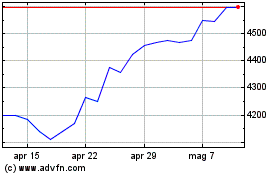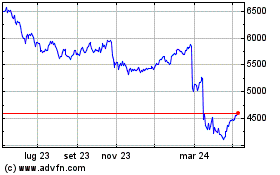Today's Top Supply Chain and Logistics News From WSJ
19 Ottobre 2017 - 1:29PM
Dow Jones News
By Paul Page
Sign up: With one click, get this newsletter delivered to your
inbox.
Bigger may no longer be better in the troubled world of
consumer-goods suppliers. Reckitt Benckiser Group PLC, one of the
world's biggest suppliers of retail brands, is splitting the
business into two divisions, the WSJ's Saabira Chaudhuri writes,
reasoning that tighter focus is more important than scale for
products like Lysol, Woolite and Mead Johnson baby food. Splitting
the business into home-and-hygiene products and consumer-health
goods makes Reckitt the latest supplier to act amid stalling sales
as consumer tastes in many key markets change fast. Shoppers are
gravitating toward smaller, local products and away from
mega-brands. Reckitt CEO Rakesh Kapoor says "channels have
changed," undercutting the scale advantage they've had in
distribution. Reckitt's separate divisions will share functions
such as procurement. Still, the split positions the business for
potentially more drastic action, and analysts are already looking
for bigger moves.
Mitsubishi Motors Corp. plans to build its way into a bigger
share of the global automotive market. The Japanese auto maker will
spend $5 billion over the next three years building new factories
and developing new cars, including electric vehicles, the WSJ's
Sean McLain reports, as it looks to expand sales in areas such as
China and restore profitability after a fuel-economy scandal.
Mitsubishi Motors is investing in its supply chain in part with the
help of Nissan Motor Co., which took a controlling stake in the
company about a year ago and also struck a cooperation pact with
France's Renault SA. The alliance is part of the broader move by
small car makers to team up for scale in auto manufacturing and
sales competition that's grown more global. Meeting goals of
boosting sales by more than 30% in the next three years and
doubling sales in China would give Mitsubishi Motors a bigger role
in that competition, and in the industry's move toward electric
cars.
U.S. officials plan to test whether state, local and federal
rules for drones can share the same airspace. They're preparing to
release a model program aimed at easing the regulatory logjam
around commercial use of drones, the WSJ's Andy Pasztor writes, by
linking Federal Aviation Administration rules to those of local
governments, including law enforcement agencies. It's an effort
that may seem more complicated than the technology behind the
unmanned aircraft because the regulations have to be tied to the
communications systems of drones while they're in fast-moving
operations. The basic idea is to have the FAA oversee commercial
drone operations between 200 feet and 400 feet in designated test
areas, with drones at lower altitudes primarily regulated by
states, counties or localities. Businesses including parcel
carriers are anxious to get things moving. But the drone-safety
debate has heated up lately amid reports of collisions involving
drones in the U.S. and Canada.
SUPPLY CHAIN STRATEGIES
Retailer Supreme is carving out a bigger role in apparel by
turning traditional inventory and distribution strategy upside
down. The underground streetwear brand has just 11 stores yet is
valued at more than teen retailer Abercrombie & Fitch Co. and
its global network of 900 outlets. The WSJ's Khadeeja Safdar
reports that it's limited distribution is its virtue as it builds a
following based on the scarcity of its products. The seller of
skateboarding T-shirts, hats and sweatshirts has tapped into the
zeitgeist of teens seeking hard-to-get looks that run counter to
the mass-produced goods that fill big industrial supply chains. The
recent sale of a roughly 50% stake to private-equity firm Carlyle
Group LP for about $500 million highlights questions about its
strategy, including whether a brand built by limiting distribution
can generate adequate growth. Supreme will likely come under
pressure to trade its carefully-cultivated scarcity for higher
volume, which risks making its supply chain and its clothing look
like those of troubled retailers.
QUOTABLE
IN OTHER NEWS
Economic activity grew at a measured pace across the U.S. in
September and October, according to the Federal Reserve. (WSJ)
U.S. housing starts fell last month for the fifth time in six
months amid hurricane-related shortages in labor and construction
materials. (WSJ)
Canadian factory sales rebounded in August, rising 1.6% on
strong auto demand and higher energy prices. (WSJ)
Blue Apron Holdings Inc. is laying off around 300 employees,
including fulfillment center staff. (WSJ)
EBay Inc.'s third-quarter profit jumped 25% to $523 million on
an 8% gain in gross merchandise volume. (WSJ)
TPG Capital hired former Ford Motor Co. chief executive Mark
Field as an adviser as it moves to expand supply chain-related
investments. (WSJ)
Delta Air Lines Inc. says it plans to take delivery of new
Bombardier Inc. jetliners built at an Airbus SE facility in
Alabama. (WSJ)
Qualcomm Inc.'s $39 billion acquisition of NXP Semiconductors is
set to close by the end of the year, paving the way for the chip
maker to be a major player in autonomous driving. (WSJ)
Private-equity group EQT will buy a medical-device maker
Clinical Innovations for about $250 million. (WSJ)
JD.com will merge membership and fulfillment systems with
Wal-Mart Stores Inc. in China, including use of the U.S. retailer's
inventory to fill online orders. (Nikkei Asian Review)
Canadian Pacific Railway Ltd.'s third-quarter net profit jumped
47% despite declining auto and grain shipments. (The Globe and
Mail)
Trucker YRC Worldwide Inc. lowered its 2017 financial outlook in
part because of the impact of hurricanes on operations.
(Reuters)
Global container throughput at ports is on track to grow 6.1%
this year, the fastest pace since 2011, according to Alphaliner.
(Lloyd's List)
Cargo tonnage moving through the expanded Panama Canal rose
22.2% in the fiscal year that ended Sept. 30, reaching a record.
(Seatrade-Maritime)
Foxconn Technology Group and venture firm IDG Capital will raise
$1.5 billion to fund startups in automotive technologies. (South
China Morning Post)
Indian refineries are exploring purchases of U.S. crude that
would open a new export market for American producers.
(MarineLink)
China's state-owned CITIC Group will take a controlling stake in
Myanmar's Kyauk Pyu seaport. (Deal Street Asia)
Third-quarter net profit at India's Blue Dart Express fell 3% as
rising expenses offset revenue growth. (Economic Times)
Amazon will take over the top six floors of the Macy's Inc.
Seattle store for office space. (Seattle Times)
ABOUT US
Paul Page is deputy editor of WSJ Logistics Report. Follow him
at @PaulPage, and follow the entire WSJ Logistics Report team:
@brianjbaskin , @jensmithWSJ and @EEPhillips_WSJ. Follow the WSJ
Logistics Report on Twitter at @WSJLogistics.
Write to Paul Page at paul.page@wsj.com
(END) Dow Jones Newswires
October 19, 2017 07:14 ET (11:14 GMT)
Copyright (c) 2017 Dow Jones & Company, Inc.
Grafico Azioni Reckitt Benckiser (LSE:RKT)
Storico
Da Mar 2024 a Apr 2024

Grafico Azioni Reckitt Benckiser (LSE:RKT)
Storico
Da Apr 2023 a Apr 2024
